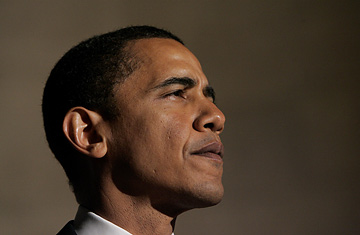
Presidential candidate Barack Obama
When the abortion rights group NARAL Pro-Choice America announced its endorsement of Barack Obama earlier this week, president Nancy Keenan and her colleagues knew their decision would raise eyebrows. The debate between Obama and Clinton supporters on the organization's board, according to those familiar with it, was "spirited." But they ultimately reached a unanimous decision to throw their support behind Obama, a longtime supporter of abortion rights, and the move was immediately assailed by Clinton supporters as a betrayal. In the process, they added new fuel to a furious debate that has raged mostly below the surface of this campaign, often dividing friend from friend and sister from sister. Do women have an obligation to support a serious woman candidate? Or is gender now simply an interesting but ultimately irrelevant consideration?
The Grrrl Power position was staked out early on by Emily's List. Less than one hour after Clinton announced her candidacy in January 2007, the group issued an endorsement statement from president Ellen Malcolm. "I am one of the millions of women who have waited all their lives to see the first woman sworn in as President of the United States," wrote Malcolm. "And now we have our best opportunity to see that dream fulfilled." Of course, given that Emily's List exists for the express purpose of electing women, it's no surprise that Malcolm would so quickly embrace Clinton, a candidate so strong she was hailed as the front-runner from the moment she entered the race.
But Malcolm and others have upped the ante, declaring that Clinton's candidacy not only compels their personal support, but also that of all feminists. After Clinton's disappointing showing in the Indiana and North Carolina primaries, Malcolm even wrote an op-ed declaring that Clinton herself had a "responsibility" to stay in the race. She owed it to all women to prove that she wasn't a quitter. The sentiment echoed Clinton's own comments on the stump, her declaration that "I am not a quitter. I do not give up."
These rousing displays of fortitude , however, don't necessarily suggest a positive message for women. Clinton's vow, in particular, moved Slate writer Dahlia Lithwick to ask what it means if feminism is "the inability to concede error or defeat — even in light of irrefutable, empirical evidence and in the face of spiraling support and tanking morale."
Which is why other leading feminists — including former NARAL head Kate Michelman and writer Katha Pollit — have taken a more pragmatic approach, endorsing Obama for reasons they say are unrelated to gender. Similarly, the NARAL board also focused its decision-making on the question of how best to blunt John McCain's appeal to swing voters, particularly moderate pro-choice women who are largely unaware of his steadfast opposition to abortion. The issue was the main topic of conversation when I met with NARAL staffers earlier in the winter and has long worried the organization. They also reportedly wanted to dampen fears that the primary season will result in splits within the party. A NARAL endorsement would, the board hoped, signal that women could back Obama with a clear conscience.
This isn't the first time that NARAL has made waves in the women's community since Keenan took over its leadership at the end of 2004. During the debate over Justice John Roberts' confirmation as Supreme Court chief justice, the organization ran a controversial ad strongly implying equivalence between the jurist's views and the actions of abortion opponents who bomb clinics. The next year, NARAL took the unusual step of endorsing then-G.O.P. Senator Lincoln Chafee in his reelection race before he even had a Democratic challenger. The group was criticized by other pro-choice allies for failing to pursue a strategy focused entirely on gaining a Democratic majority in Congress. NARAL's endorsement of Joseph Lieberman in his 2006 Senate campaign against liberal opponent Ned Lamont raised similar concerns in the women's community.
Keenan herself is a somewhat unusual figure in the broader women's and abortion rights community. A Catholic from Montana, she delivered an unorthodox speech on the 35th anniversary of Roe v. Wade earlier this year. Talking openly about her experience as a pro-choice Catholic, Keenan also called on her pro-choice compatriots to recognize their own missteps in confronting the abortion issue. "As positions on both sides of this debate have hardened the past three decades, they have also grown more distant from the lives of everyday people," she told the audience [italics hers]. "The slogans and bumper stickers that paint this issue in black and white no longer touch the profound complexity most people feel on the issue of abortion."
Those slogans and bumper stickers have long given comfort to — and helped solicit donations from — staunch abortion rights supporters. Many NARAL state affiliates whose members come from the ranks of second-wave feminists who prefer purist positions have been openly uneasy with this new openness on the part of the national organization, as well as NARAL's relative openness to the focus on abortion reduction currently being embraced by congressional Democrats. The Obama endorsement reignited those concerns, so much so that at least a half dozen NARAL affiliates from states including Pennsylvania, Missouri and New York wasted no time distancing themselves and underscoring their continued neutrality in the ongoing Democratic contest.
But politics is also, well, political, and NARAL was well aware that if it had withheld its endorsement much longer, it would have risked irrelevance. Now it's so relevant, of course, that it has succeeded in reinvigorating weary Clinton supporters. But that too may fade. Despite Malcolm's feisty rhetoric, her organization has not included references to Clinton's candidacy on the fund-raising appeals they have sent out since the Indiana and North Carolina primaries, as they did with earlier missives. Even candidates of the sisterhood have their expiration dates.
